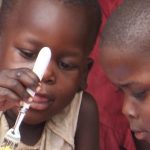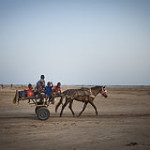On March 8, 2019, the world celebrates International Women’s Day—a day dedicated to raising awareness on the importance of achieving gender parity in the working world. To understand women’s role in agriculture and to close the gender gap in agricultural production, the International Food Policy Research Institute’s (IFPRI) research has been examining gender differences within rural households and communities for over 25 years.
IFPRI & DFID: 30 years of Making a Difference
IFPRI’s work in providing cutting-edge research on food and nutrition security has long depended on strategic partnerships with donors, universities, research organizations, and others around the world. One of the Institute’s key collaborators is the United Kingdom’s Department for International Development (DFID), which has served as a strategic and collaborative donor and partner to IFPRI for more than 30 years.
Highlights of IFPRI and DFID Partnership
For more than 40 years, the International Food Policy Research Institute (IFPRI) has been providing cutting-edge research and policy options on food and nutrition security to partners in donor and recipient countries around the world.
A Tailored Approach to Address Climate Change Impacts in Ethiopia and South Africa
MOTIVATION Global climate change impacts food and water security in significant ways, and developing countries will most likely bear the brunt of the adverse consequences. The lack of adaptive capacity and already high levels of poverty make these countries’ rural population and agriculture sector vulnerable. With support from the Federal Ministry for Economic Cooperation and >> Read more
Strategies for Adapting to Climate Change in Rural Africa
The impact of climate change will be most severe in tropical countries, like many countries in Africa south of the Sahara—particularly in those that have scarce resources to channel into adaptation strategies, whose policy makers lack information, and where there is significant poverty. Even small climate changes can have a significant impact on farmers’ livelihoods and overall wellbeing. With support from the Federal Ministry for Economic Cooperation and Development (BMZ) and the CGIAR Research Program on Climate Change, Agriculture, and Food Security (CCAFS), IFPRI worked with the Association for Strengthening Agricultural Research in Eastern and Central Africa (ASARECA), the Food, Agriculture and Natural Resources Policy Analysis Network (FANRPAN), and other national partners to generate country-level analyses on climate change impacts and adaptation strategies for 10 countries in East Africa and 8 countries in southern Africa. IFPRI published the results in three books released in 2013: East African Agriculture and Climate Change: A Comprehensive Analysis, Southern African Agriculture and Climate Change: A Comprehensive Analysis, and West African Agriculture and Climate Change: A Comprehensive Analysis.
The Economics of Land Degradation
Land degradation is a serious threat to long-term food security. To resolve the paradox of growing land values in the face of continually low investment levels, research-based policy action is needed. With this in mind, IFPRI and the Center for Development Research at the University of Bonn (ZEF) researchers, with support from BMZ and later from the CGIAR Research Program on Policies, Institutions, and Markets (PIM), gathered and analyzed existing knowledge on land degradation as part of the Economics of Land Degradation initiative.
- 1
- 2
- 3
- …
- 8
- Next Page »





